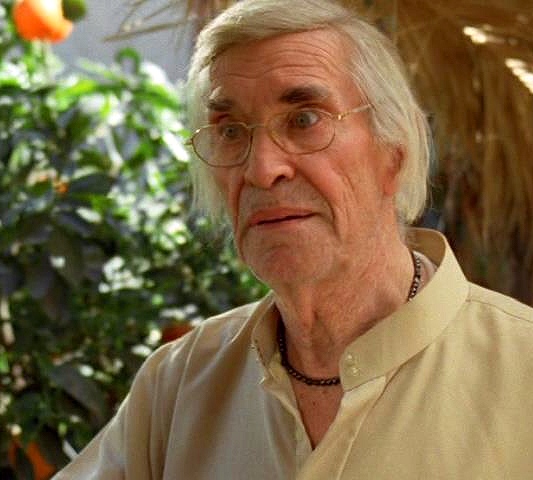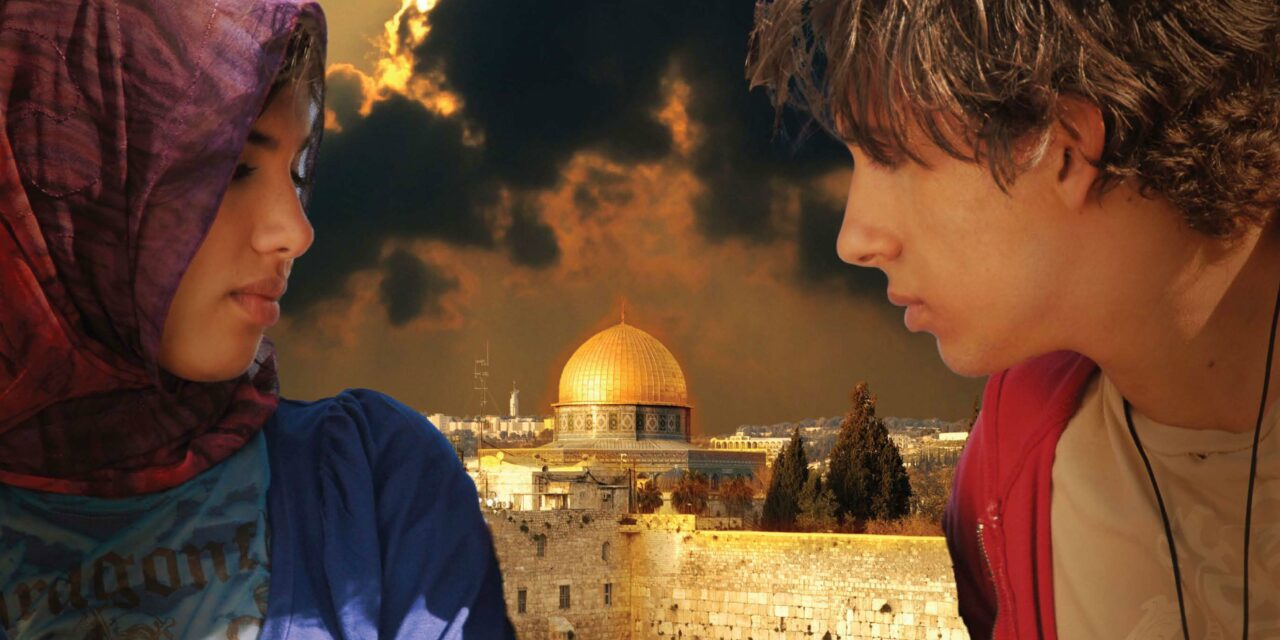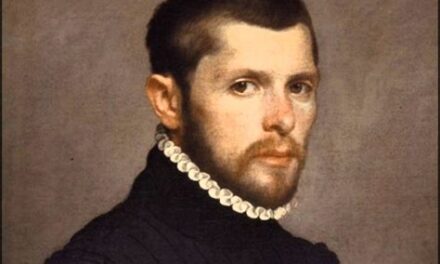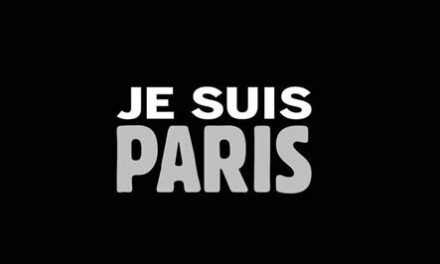David & Fatima by Alain Zaloum was released in 2008, but the current war in Gaza has made it timely. Like West Side Story, it is a modern version of Romeo and Juliet, but the difference that separates the lovers is not political like the Montagues and Capulets or ethnic like the Jets and Sharks, but religious. David is a Jew and Fatima is a Muslim, living in Israel where interfaith marriages are illegal.
Sadly, this independent film was generally ignored in Israel. The budget was merely $600,000. Most of the filming was done in Los Angeles, yet some scenes were shot in Israel. Martin Landau was 80 years old at the time of filming and Tony Curtis 83. Coincidentally, Curtis’ name in the film is Mr. Schwartz, yet he was born Bernard Schwartz! His parents were Hungarian Jews.
The film begins with two couples going to the hospital for the births of their children. Significantly, their cars block each other’s way. While the men argue, their wives start giving birth! Fortunately, Ishmael Aziz is a physician and delivers both babies there. Like Shakespeare’s “star-crossed lovers,” David and Fatima came into the world at the same time.
Later, the Muslim woman, Aiida Aziz, explains to her little daughter, Fatima, that all Arabs came from Ishmael, which happens to be her husband’s name. Meanwhile, the Jewish man, Benny Isaac, explains the same origin of the animosity between Jews and Arabs to little David and his sister, Tami. Significantly, his name is Isaac. Both imagine that each side is jealous of the other.
 Suddenly, David and Fatima are grown up. Fatima, distracted by music in her earbuds, almost walks into traffic, but David saves her. Soon afterward, a suicide bomber kills 22 on a bus. David too would have died if Fatima had not delayed him. So, they saved each other’s lives. They are each other’s “guardian angel.”
Suddenly, David and Fatima are grown up. Fatima, distracted by music in her earbuds, almost walks into traffic, but David saves her. Soon afterward, a suicide bomber kills 22 on a bus. David too would have died if Fatima had not delayed him. So, they saved each other’s lives. They are each other’s “guardian angel.”
By coincidence, both families go to the same restaurant to celebrate the 18th birthday of David and Fatima. The parents of both recognize each other and their children get to know each other. Although they plan to meet later, Fatima is not allowed to go out after the suicide bombing.
Hassan, who is like Shakespeare’s Tybalt, is interested in Fatima. She learns that his cousin, Mahmoud, was the “martyr” on the bus and now the Israelis will destroy the home of his aunt. Hassan asked Ishmael to take Fatima out, and he lets him. Meanwhile, David’s friend, Avi, who is not like Shakespeare’s Mercutio, takes him to the same disco. When Hassan gets bossy, Fatima tries to leave with David, but Hassan hits David. She finds him outside and they kiss.
 David receives his letter of recruitment into the Israeli Defense Forces (IDF), just as his relationship with Fatima begins to bud. When they get together again, she says that one does not change Jerusalem; one is changed by it. Yet, she acknowledges that with courage and a good heart, one can change the world. She is afraid that the military will change him, but David promises that it will not. He would be in for 32 months. David’s sister, Tami, who is already in the IDF, warns him that the Arabs will kill Fatima if they find out.
David receives his letter of recruitment into the Israeli Defense Forces (IDF), just as his relationship with Fatima begins to bud. When they get together again, she says that one does not change Jerusalem; one is changed by it. Yet, she acknowledges that with courage and a good heart, one can change the world. She is afraid that the military will change him, but David promises that it will not. He would be in for 32 months. David’s sister, Tami, who is already in the IDF, warns him that the Arabs will kill Fatima if they find out.
Hassan finds them walking. He badly beats David and threatens Fatima. The parents of both meet in the hospital where David has a concussion and broken ribs. Ishmael slaps his daughter, saying that she needs to understand their culture and tradition. Tami tells her brother that she does not want to “sit shiva” for him, meaning seven days of mourning.
 Old Mr. Schwartz on his wheelchair advises David not to let go of his love because he will spend the rest of his life looking for it. Coincidentally, Tony Curtis died only two years after this film. Notice Dr. Levi played by Robert Miano, who in other religious movies has played the Prophet Daniel and Mordecai. Meanwhile, Ishmael invites the Imam, an Islamic leader, to their home to discuss sending Fatima to Jordan or Syria and arranging a marriage.
Old Mr. Schwartz on his wheelchair advises David not to let go of his love because he will spend the rest of his life looking for it. Coincidentally, Tony Curtis died only two years after this film. Notice Dr. Levi played by Robert Miano, who in other religious movies has played the Prophet Daniel and Mordecai. Meanwhile, Ishmael invites the Imam, an Islamic leader, to their home to discuss sending Fatima to Jordan or Syria and arranging a marriage.
After returning home, David’s parents, “abba” (dad) and “imma” (mom), ask him to promise not to see Fatima again. He nods silently, but goes to her at night and proposes marriage. They elope. Because they cannot be married by Jews or Muslims, they find a Catholic priest, but that too is futile. They would have to go to Cyprus for a civil marriage, but they have no money. Benny and Ishmael agree that if they find their children, they will never let them be together again. They shake hands, but immediately try to wash off the touch, signifying the depth of their hatred.
 Next, David and Fatima visit the progressive Rabbi Schmulic, played by Martin Landau. Schmulic tells them that a marriage is the union of two families. Neither claims to have any hatred for the other’s tribe. Although he has no legal authority, he performs a wedding ceremony. In an abandoned building in the desert, David and Fatima have their honeymoon, but the next day, they are arrested for stealing Benny’s car. They are separated and returned to their parents.
Next, David and Fatima visit the progressive Rabbi Schmulic, played by Martin Landau. Schmulic tells them that a marriage is the union of two families. Neither claims to have any hatred for the other’s tribe. Although he has no legal authority, he performs a wedding ceremony. In an abandoned building in the desert, David and Fatima have their honeymoon, but the next day, they are arrested for stealing Benny’s car. They are separated and returned to their parents.
A year later, David is a member of the IDF. He visits Schmulic who hands him a letter from Fatima. Unlike Christianity which is centered on mercy, Schmulic says that the Holy Land is an “unforgiving place.” While on patrol in Gaza, David tracks her down. Like the Shakesperean tragedy, nevertheless, this one too ends in death. What began on the same day, ended on the same day.
The film makes a sincere effort to resolve hatred with love, but no artist can undo what was foretold in the Word of God (Gn.16:12): the hostility will endure as long as time itself. Still, the story can teach Christians much about life in Israel today while inspiring sympathy for the suffering and hope for peace.















One of my favorite movies. I saw it back in college when I was 19 or so. I’m 34 now. I loved it so much, I found the director’s e-mail and wrote to him telling him how much I loved his film.
It was so cheap, very low budget, and it shows, but the heart is there, the love is there. The essence of this film, for me, is powerful, magical. No matter how it looks, I felt it deeply.